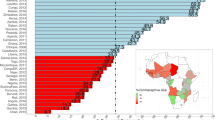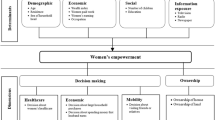Abstract
To date, limited evidence is available for urban populations in sub-Saharan Africa, specifically research into the association between urban women’s empowerment and reproductive health outcomes. The objective of this study is to investigate whether women’s empowerment in urban Nigerian settings is associated with family planning use and maternal health behaviors. Moreover, we examine whether different effects of empowerment exist by region of residence. This study uses baseline household survey data from the Measurement, Learning and Evaluation Project for the Nigerian Urban Reproductive Health Initiative being implemented in six major cities. We examine four dimensions of empowerment: economic freedom, attitudes towards domestic violence, partner prohibitions and decision-making. We determine if the empowerment dimensions have different effects on reproductive health outcomes by region of residence using multivariate analyses. Results indicate that more empowered women are more likely to use modern contraception, deliver in a health facility and have a skilled attendant at birth. These trends vary by empowerment dimension and by city/region in Nigeria. We conclude by discussing the implications of these findings on future programs seeking to improve reproductive health outcomes in urban Nigeria and beyond.
Similar content being viewed by others
References
National Population Commission (NPC)—Nigeria and ICF Macro. (2009). Nigeria demographic and health survey 2008. Calverton, Maryland: National Population Commission and ICF Macro.
United Nations Children’s Fund (UNICEF). At a glance: Nigeria—Statistics. 2010. Retrieved November 22, 2011, from http://www.unicef.org/infobycountry/nigeria_statistics.html.
United Nations Department of Economic and Social Affairs (UNDESA). World Urbanization Prospects: The 2009 Revision. 2009. Retrieved November 22, 2011, from http://esa.un.org/unpd/wup/index.htm.
Tacoli, C. (2012). Urbanization and emerging population issues, working paper 7: Urbanization, gender and urban poverty: paid work and unpaid care in the city. International Institute for Environment and Development, United Nations Population Fund.
Malhotra, A., Schuler, S., & Boender, C. (2002). Measuring women’s empowerment as a variable in international development. Background paper prepared for the World Bank workshop on poverty and gender: New perspectives. USA: World Bank Publications.
Kabeer, N. (2001). Reflections on the measurement of women’s empowerment. In discussing women’s empowerment-theory and practice. Sida studies No. 3. Stockholm: Novum Grafiska AB.
Beegle, K., Frankenberg, E., & Thomas, D. (2001). Bargaining power within couples and use of prenatal and delivery care in Indonesia. Studies in Family Planning, 32(2), 130–146.
Bloom, S. S., Wypij, D., & Gupta, M. (2001). Dimensions of women’s autonomy and the influence on maternal health care utilization in a north Indian city. Demography, 38(1), 67–78.
Beegle, K., Frankenberg, E., & Thomas, D. (2001). Bargaining power within couples and use of prenatal and delivery care in Indonesia. Studies in Family Planning, 32(2), 130–146.
Ronsmans, C., & Graham, W. J. (2006). Maternal mortality: who, when, where, and why. Lancet, 368(9542), 1189–1200.
Chowdhury, M. E., Ronsmans, C., Killewo, J., Anwar, I., Gausia, K., Das-Gupta, S., et al. (2006). Equity in use of home-based or facility-based skilled obstetric care in rural Bangladesh: an observational study. Lancet, 367(9507), 327–332.
Furuta, M., & Salway, S. (2006). Women’s position within the household as a determinant of maternal health care use in Nepal. International Family Planning Perspective, 32(1), 17–27.
Ying, C., Li, Y., & Hui, H. (2011). The impact of husbands’ gender equity awareness on wives’ reproductive health in rural areas of china. Obstetrical & Gynecological Survey, 66(2), 103–108.
Kumar, K., & Tiwari, M. (2012). Women’s autonomy and utilization of maternal and child health care services in India. Oral session presented at the Population Association of America 2012 Annual Meeting, San Fransisco, CA.
Fotso, J. C., Ezeh, A. C., & Essendi, H. (2009). Maternal health in resource-poor urban settings: how does women’s autonomy influence the utilization of obstetric care services? Reproductive Health, 6, 9.
Gage, A. J. (2007). Barriers to the utilization of maternal health care in rural Mali. Social Science and Medicine, 65(8), 1666–1682.
Blanc, A. K., & Wolff, B. (2001). Gender and decision-making over condom use in two districts in Uganda. African Journal of Reproductive health/La Revue Africaine de la Santé, 5(3), 15–28.
Woldemicael, G. (2009). Women’s autonomy and reproductive preferences in Eritrea. Journal of Biosocial Science, 41, 161–181.
Ahmed, S., Creanga, A. A., Gillespie, D. G., & Tsui, A. O. (2010). Economic status, education and empowerment: implications for maternal health service utilization in developing countries. PLoS ONE, 5(6), e11190.
Singh, K., Bloom, S., Brodish, P. (2011). Influence of gender measures on maternal and child health in Africa. Chapel Hill, NC: MEASURE Evaluation Technical Report.
Do, M., & Kurimoto, N. (2012). Women’s empowerment and choice of contraceptive methods in selected African countries. International Perspectives on Sexual and reproductive Health, 38(1), 23–33.
Kritz, M. M., & Makinwa-Adebusoye, P. (2001). Couple agreement on wife’s autonomy and reproductive dynamics in Nigeria. In Presented at Session 88: Gender roles and population outcomes at The International Union for the Scientific Study of Population, Salvador, Brazil.
Angel-Urdinola, D., & Wodon, Q. (2010). Income generation and intra-household decision making: A gender analysis for Nigeria. In J. S. Arbache, A. Kolev, & E. Filipiak (Eds.), Gender disparities in Africa’s labor market. Washington, DC: The World Bank.
Acknowledgments
Funding for this work comes from the Bill & Melinda Gates Foundation. This research was also supported by Grant, 5 R24 HD050924, Carolina Population Center, awarded to the Carolina Population Center at The University of North Carolina at Chapel Hill by the Eunice Kennedy Shriver National Institute of Child Health and Human Development. The contents of this paper are solely the responsibility of the authors and do not necessarily represent the official views of the funders. Earlier versions of this paper were presented at the International Family Planning Conference in Dakar, Senegal and at the Sixth African Population Conference in Ouagadougou, Burkina Faso. At the time the work on this Project was performed, JC Fotso and L Irani were working on the Measurement, Learning & Evaluation Project through the organizations listed. The authors would also like to thank Priya Nanda and Barbara Burke for their contributions to this paper.
Author information
Authors and Affiliations
Corresponding author
Rights and permissions
About this article
Cite this article
Corroon, M., Speizer, I.S., Fotso, JC. et al. The Role of Gender Empowerment on Reproductive Health Outcomes in Urban Nigeria. Matern Child Health J 18, 307–315 (2014). https://doi.org/10.1007/s10995-013-1266-1
Published:
Issue Date:
DOI: https://doi.org/10.1007/s10995-013-1266-1




